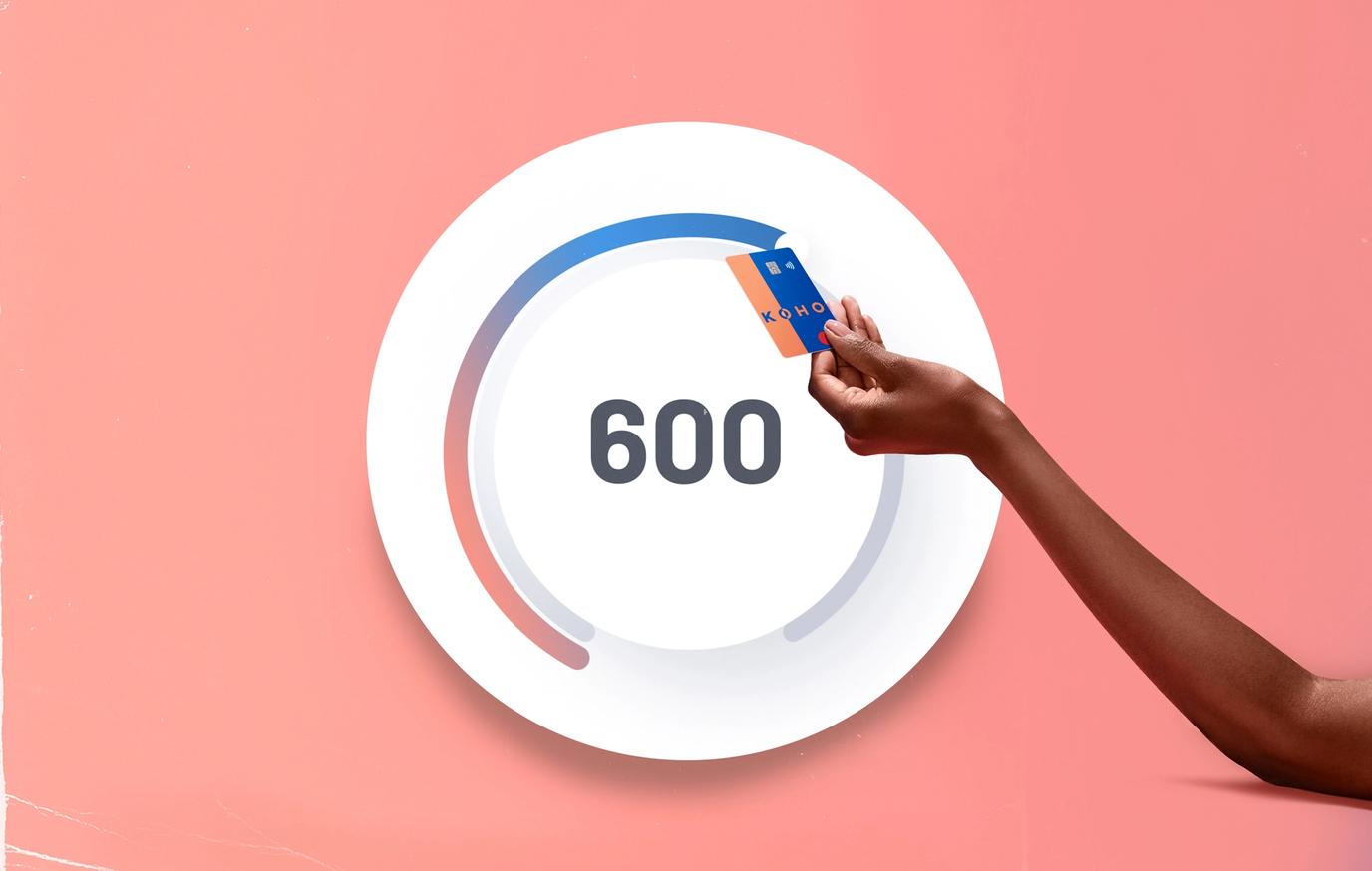Back to learn
Can I get a credit card with bad credit?

Written By
Rounding it up
Credit ratings in Canada range from 300 to 900, and anything under 560 would be “poor” or “bad” in the eyes of most credit bureaus.
Don’t know your credit score? You can find out by applying for a loan or credit card, or conducting an online credit score check.
With a subpar credit score, you’ll likely only have access to “secured” cards, which require a security deposit. Alternatively, you can sign up for prepaid credit cards.
When searching for a secured card, pay attention to interest rates, security deposit/credit limit, annual fees, and easy bill payment features.
Like it or not, your credit score has a significant effect on your financial life.
With a good credit rating, the world is your oyster. Banks are usually more than happy to dole out loans and credit cards to people with excellent credit scores.
Canadians with bad credit scores, however, often find that lenders aren’t too keen to work with them. This can make getting a credit card seem out of reach for anyone with a less-than-stellar financial history.
The good news is that it's possible to get a credit card with bad credit, though it might take a bit of extra effort on your part. It's also worth noting, if you want to get a head start on (re)building your credit history, check out KOHO's Credit Building tool. It was created to help Canadians build their credit history for only $10/month. Seriously, that's it.
Anyways, here’s what you need to know about credit cards for bad credit and how using one in conjunction with your KOHO account can help you take charge of your financial well-being.

What is a bad credit score in Canada?
Before we get too far ahead of ourselves here, let’s talk a bit about what a “bad credit score” actually is.
Credit ratings in Canada range from 300 to 900, though the average Canadian credit score is between 660-760. Anything within this average is considered “good” or “very good” and any credit scores above this average are considered “excellent” by most lenders. On the other hand, a score between 560 and 660 is considered “fair.”
Meanwhile, anything under 560 would be “poor” or “bad” in the eyes of most credit bureaus.
While most Canadians will find they can still get a credit card or a loan with a fair credit rating - albeit with some pretty high interest rates - anyone with a poor credit score will often struggle to find anyone that’s willing to lend them money.
How do I know if I have a bad credit score?
Not sure what your credit score is? Knowing your approximate credit score is important if you’re looking to find a credit card or loan that will work for your credit history.
The most definitive way to know your credit rating is to apply for a loan or credit card. However, frequently applying for a credit card just to know what your score is actually negatively impacts your credit rating. This is because it makes lenders think that you’re living beyond your means.
As a result, the best way to get a good estimate of your credit score is to do a credit score check with a credit bureau. There are two main credit bureaus in Canada - TransUnion and Equifax - both of which base their ratings off of your FICO Score.
Since you have to pay a fee for these credit reports, many Canadians opt to request a free credit score from companies like Borrowell or Intuit Credit Karma.
If you were to request a score from all 4 of these institutions, you’d probably notice slight variations between each credit report. So, when you check your score, use your free credit report (Canada) as a general estimate of how good your credit is, rather than fixating too much on the specific score you receive.

Credit cards for bad credit
Once you know what your credit score is, it’s time to get to work with finding a credit card that will work for your needs.
When you have a bad credit score, most of the credit cards available to you will be “secured” cards. These cards require that you put down a security deposit - usually around $500 to $1,000 - as a form of collateral should you miss your payments.
It might seem like a bit of a bummer to have to put money down on your new credit card. However, doing so helps you get a secured credit card, which is a solid way to improve your credit and to show prospective lenders that you’re responsible with your money.
If you don’t quite have the money on hand to pay for a security deposit on a secure credit card, you can start to build up a small nest egg using your KOHO prepaid Mastercard.
Since you earn cash back on groceries and transportation with your KOHO card, you can start to save this money and set it aside for your future credit card. You could also set up RoundUps on your account to help you save more money on each purchase you make.
What to look for in a secured credit card
Once you have enough saved to put down on a secured card, you can apply for a credit card through many of Canada’s financial institutions. Many major banks in Canada have secured cards, which are specifically designed to help people rebuild their credit rating.
When doing your research for a new secured credit card, here are a few things to look for:
Lower interest rates
Although you should plan to pay your credit card balance off in full each month (avoiding interest rates in the process), lower interest rates are ideal for any new secured card.
Most secured credit cards tend to have higher interest rates than their unsecured counterparts, so be prepared to see rates that are a bit higher than you’re used to. Be on the lookout for low rates (anything under 19% is low by secured credit card standards) as you do your research.
Security deposit/credit limit
With a secured credit card, your credit limit is generally 1-2 times the amount that you put down for a security deposit. The more you can put down upfront, the higher your credit limit.
While having a higher limit might seem really important, remember that your secured credit card is a stepping stone toward getting an unsecured card in the future.
If having a lower limit makes you less likely to overspend each month, it might actually be a good thing for your credit in the long term. You may not be able to charge as much to your secured card, but keeping your credit card spending low actually looks better for your credit score.
If you don’t have a high limit on your secured card, you can also use your KOHO prepaid Mastercard to pay for most of your larger expenses while using your credit card for smaller costs. That way, you can still earn cash back and work to build your credit history along the way.
Annual fees
Some secured credit cards charge annual fees, especially if they also offer cash back rewards. Many banks that offer secured cards do so to help lower their risks when lending to people with bad credit. If possible, opt for a card with no fee, or, at the very least, one with as low a fee as you can find.

Easy bill pay features
You want to be sure that you pay off your secured credit card in full each month to avoid paying any interest and to build up your credit history. The easiest way to do so is to find a card that lets you pay your bill electronically (which is most of them, by the way).
You can then manually pay your bill within your KOHO app or you can set up automatic withdrawals so you never miss a payment.
Paying your credit card bill with your KOHO account also helps you manage your spending using your account’s built-in budgeting tools. That way, you can see how much you’re charging to your secured credit card each month and keep track of your financial health.
Bad credit, no problem
Having a bad credit score might make it seem like getting a credit card is impossible, but there are plenty of secured credit cards for you to choose from.
If you don’t have enough saved up to put down as a security deposit on a secured card, you can put the cash back that you earn with your KOHO prepaid Mastercard toward this purpose.
Then, when you’re ready for a secured card, you can balance out your spending and pay your bills using your KOHO account to help increase your credit score for a happier, healthier, financial life.

Gaby Pilson
Gaby Pilson is a writer, educator, travel guide, and lover of all things personal finance. She’s passionate about helping people feel empowered to take control of their financial lives by making investing, budgeting, and money-saving resources accessible to everyone.